- Home
- Dornford Yates
Courts of Idleness Page 4
Courts of Idleness Read online
Page 4
“I say,” he said, as he opened the door, “there’s no one anywhere. It must be the dog-watch.”
No answer.
“My dear,” he said, leaning forward and stretching a hand towards the head of the bunk.
But where her shoulder should have been there was nothing. Save for its sheets and blankets, the bunk was empty. The ship had passed.
Robin Broke swore thoughtfully. Then he sat down on the edge of the bunk and began to laugh…
Preparation for the night upon a ship which is wallowing in the midst of an angry sea is a business to be gone about circumspectly. The fact that his electric light was out of order hampered Robin considerably. For all his care, rails, corners, and similar excrescences, which at the more outrageous moments he essayed to grasp, eluded his groping fingers, and by the time he was ready to clamber into his bunk, he had sustained a whole series of bruises and a most painful abrasion of the left shin. It was while endeavouring to remove his trousers that he had been precipitated violently on to the floor. There and then he had dealt with the Atlantic Ocean. From one point of view his description of it was masterly.
As he was disposing the sheets, his hand encountered something hard and rough to the touch – almost sharp-edged, able to scratch. For a moment he fingered it curiously. Was it a brooch? No. Yet… The next second he knew what it was. An earring. Instantly his thoughts flew to the fair South African. But it was of a different shape to those she had been wearing. Besides, it had not been her voice.
Broke forgot the Atlantic and his recent battery, even the abrasion upon his shin. With a smile he slipped the earring into the breast-pocket of his pyjamas.
“Lost,” he murmured, “one dainty earring. The finder will be – ah, suitably rewarded. And this is going to save me a lot of trouble.”
“And may I ask,” said Fairie, “if the arena of political life (sic) has never beckoned you?”
The eminent King’s Counsel frowned.
“There are some invitations,” he said, “which I disregard. One cannot be too careful of the company one keeps.”
Sunday. The three men were sitting easily in the afternoon sun. It was good to rest a little after a heavy lunch. Already the air was appreciably warmer, while the wind had dropped to a stiff breeze. Somehow it was difficult to realize that it was not yet twenty-four hours since they had left Southampton. A fair sea was running, but it was not nearly so rough.
Broke rose to his feet, laughing.
“Where are you going?” said Fairie.
“To get some cigarettes.”
“All right,” said his cousin. “But how did you know I wanted one?”
But Broke was already out of earshot.
When he reached his cabin, he fastened the door back, took out his keys, and stooped to unlock his dressing case. It was then that he noticed the envelope, lying upon his pillow, addressed to “—Broke, Esq.” The note it contained was short enough in all conscience.
Dear Ship – Please, have you got my earring? I think it must have come unscrewed whilst I was lying down. If you have, will you leave it with the Purser? Please. – Your Sister Ship.
PS – You were very nice to me.
When he had read it twice, Robin slipped the note into his pocket, turned again to his case and extracted the cigarettes. Before rejoining his cousin and the man of law, he made his way to the writing-room. There he sat down and wrote his answer.
Sister Ship Dear, – Yes, I have. No, I will not leave it with the Purser. You shall ask for it nicely in person. You know me, and I want to know you. Thank you for saying I was nice. You were sweet. – Your Ship.
PS – I get off at Rih.”
Then he went to the Purser’s office.
“It’s just this,” he said. “If anyone should come and ask about a lost earring, this note’s for the owner.”
The Purser nodded.
“I’ll see she gets it,” he said.
Robin thanked him and made his way back to the others.
“You have been quick,” said Fairie. “Did they have to move much luggage to get at yours? In the hold, I mean.”
“I saw no reason to hurry,” said Broke coolly. “You smoke too many cigarettes. I’ve had to speak to you about it before. By the way,” he added, “did I tell you that when I went to turn in last night, my electric light wouldn’t work?”
The lawyer gazed at him.
“Am I to understand,” he said, “that you were therefore compelled to essay those preparations, which precede repose, in total darkness?”
“You are,” said Broke.
“In that case, I fear you must have sustained several contused wounds.”
“Yes,” said Fairie. “Was it a darkness that could be felt, brother?”
“I don’t know about the darkness,” said Broke. “The furniture was there all right.”
“How incredibly chastening!” mused the lawyer.
“It was, rather,” said Broke. “What would you have done?”
“And or said?” said Fairie.
The KC rose to his feet before replying.
“I do not think,” he replied, “that I should have hurried down the alphabet.”
As he strolled leisurely away down the deck:
“Brother,” said Broke to Fairie, “this man is a privilege.”
“More,” said Fairie. “I see in him The White Hope.”
The weather continued to improve, making their path smooth, the voyage very pleasant. The Brokes and the Fairies made the most of their time. But then, so they did always. Besides The White Hope and the girl bound for South Africa, they came to know many people. The ship liked them. Fairie organized the ‘sweep’ on the day’s run, Broke helping him, so that the auction was successful beyond expectation. Even the smoking-room steward, a hardened veteran, was surprised at the bidding. That was on Monday. And an hour and a half’s cricket in the afternoon served to pass the time. Not that it hung heavily. So far from mattering, the fact that there was little or nothing to do was very comfortable. So engaging may be the atmosphere of fresh surroundings. The voyage had not had time to begin to pall.
The hours slipped by, the ship’s bells telling them; yet the earring’s owner did not make herself known. Robin Broke had done nothing. His policy was to wait. Obviously, it was up to my lady to make the move. Of course, when opportunity offered, he had looked closely at three or four of his fellow-passengers who seemed to answer more or less roughly to the slight description he could have given. But it was very difficult. Once he made up his mind that he had discovered the girl. He had run into her on Monday morning at the top of the stairs. So pretty and graceful she was, with her small gloved hands and an innocent look on her face that was full of promise. Big-eyed, too, and wearing no earrings, though that was nothing to go by. Something about her seemed to suggest the identity he sought. Gravely he had asked if she would take tickets for the ‘sweep,’ almost sure of his ground. Almost… Then she had opened the red lips. Her he-American accent stung Broke like a lash. The ground crumbled away suddenly.
Broke wandered down to his cabin on Tuesday night a little uneasily. The liner would arrive at Rih early the next morning, and, even supposing my lady were herself going no further, it seemed awkward not to restore the earring before he left the ship. After all, it was her property, and if he could not find her on board, it was longer odds against his identifying her in Rih. Moreover, she might not know where he was going to stay. Looming always in the background was the possibility that she was going on to the Cape.
It was with something more than irritation that he discovered, on entering his cabin, that once again the electric switch would not answer to his touch, Robin let out a rugged oath.
“Hush,” said my lady.
“Herself,” said Robin.
“In person. And now, please, may I have my earring?”
His reply was to twist the switch-button furiously. But it was no good – the light would not come on.
�
��This is the limit,” groaned Robin. Then: “Come into the corridor,” he added. “I’ll give it to you there.”
“No,” said the girl. “I was to ask for it nicely in person. I’ve done so.”
“I believe you’re a shadow,” said Robin; “the Spirit of Darkness. Yet your fingers were firm,” he added musingly, “and there was a faint scent—”
“Ships that pass in the night,” she said slowly. “In the night.”
“Perhaps,” said Robin. “But the fourth line says: ‘Only a look and a voice, then…’”
“I had the look, ship. I saw you, you know.”
“And you have the voice, my dear. The softest I ever heard. But you can’t have everything. Where do I come in?”
“Haven’t you got the earring?”
Broke shifted his ground.
“Why should we keep to the poem?” he said. “It’s a great mistake to sail too close to the wind, sister ship. Didn’t you know that?”
“Yes. And that’s why you’re going to give me my property and let me go.”
“Do you ask that?”
“I do.”
In silence Broke drew the earring out of his waistcoat pocket.
“Give me your hand,” he said.
Fingers brushed against his sleeve. Gently he took the slight wrist and put the earring into the little palm. The fingers closed over it.
“Thank you,” in a low voice.
“I say,” said Robin.
“Well?”
Still holding the one, he sought for and found another cool wrist.
“I think we ought to salute one another, sister ship.”
“I’ve presented arms, haven’t I?”
“Charmingly. But at sea…”
He raised her wrists slowly and set them upon his shoulders. Then he released his hold. The soft arms might have slipped away…
For a second she let him hold her. Then:
“I don’t think the switch is out of order,” she whispered, moving towards the door. “It was all right when I tried it. And – and you’ll find the lamp in your bunk.”
The next moment she was gone.
At seven o’clock the next morning the Brokes and the Fairies started to go ashore. And The White Hope with them. As Robin stepped on to the accommodation ladder, something impelled him to look up. Exactly above him, leaning upon the rail of the promenade deck, was the he-American girl he had encountered on Monday. She looked at him steadily, a faint smile on her lips, open merriment in the big brown eyes. For a moment Broke stared at her. Then he took off his hat… Even a disinterested party must have remarked her earrings.
3: To Seat Four
“Shall we rest here a minute?” said The White Hope. “It’s rather a climb, isn’t it?”
“Oh, but it is so lovely,” said Betty, sinking on to a low stone seat, to gaze down and over the smiling bay. “Isn’t this wonderful, Robin?”
Her cousin deposited three heavy coats, two tennis rackets and a despatch-case upon the parapet before replying. Then:
“Glorious,” he said.
A ripple of laughter floated up from the curling flight of steps they had just ascended. The next moment Fay Broke stumbled into view, her fresh young face alight with merriment.
“Oh,” she cried, “Bill’s being so awfully funny about your bag, darling. He says – Oh, I say how lovely! Look at the sun on the mountains.”
The prospect was very pleasing.
The terrace was set upon the edge of the cliff, down whose side steps had been built and fashioned in odd curving flights to the dark rocks below. Here was a rough-hewn landing-place, to which a launch belonging to the hotel was used to bring visitors from the liners in the bay. So it had brought the Fairies, Betty, and Bill, at half-past seven o’clock that fair March morning. The Brokes, too, and the man of law. The latter had constituted himself their guide. Had he not been to Rih before – many times?
Rih. From islands set in the midst of shifting ocean, you have almost a right to expect something. Perilous seas and faery lands seem to go together – the one but the toll-bar to the other. Rih.
Far at the back, high mountains stood up against the sky, their steep heights thickly wooded, the line of them broken now and again by a sheer gorge, for all the world as if the ridge had started asunder at some mighty shock, suffered when Time was young. Very fair, these timbered heights, very arresting; but the mighty sweep of the mountains away and down into the glistening sea – that was the thing. A sweep miles long, steep at the first and then growing ever more gentle, its warm slopes rich with wood and sward and plantation and, presently, with flower-gardens, yet never losing the line of its grand curve, till the ribbon of surf in the bay cut it across, noisily marking the place where land slipped under water. All about the sides of the bay hung the little town of Starra, its white-walled houses clustering thick by the water’s edge and thence scrambling creeper-wise up the long slopes, to lose their fellows and at last themselves in the deep gardens and the woods above. The blue of the sea itself was wonderful, and the great sky matched it. The hue was almost that of the Mediterranean. On the horizon, straight ahead, two shadowy forms seemed to float upon the face of the waters – baby islands, these. Except for them, beyond the bay itself, there was no land, no sail, nothing. Miles away a faint wisp of smoke betrayed the whereabouts of some liner, herself hulled down behind the vast spaces of the Atlantic, which appeared to stretch endlessly into the distance, about it an air of such superb immensity that all talk of mastery and subjection, ruling the waves, and the like, seemed on a sudden impertinent, vain, very ridiculous. Over all, the sun blazed out of the heaven, crowning beauty with splendour, making the blue sea brilliant, the grand sweep of the mountains glorious indeed.
The prospect was very pleasing.
Fairie’s head appeared above the topmost step. For a moment he stood regarding the others, who were gazing over the sunlit bay. Then: “If I were to drop this bag,” he said, “it would imbed itself in the rock.”
“It isn’t really heavy,” said Broke, looking round. “The trouble is, you’re not carrying enough in the other hand. If you were, you wouldn’t notice it. All a matter of balance, you know,” he added airily.
Fairie looked at him.
“Would you rather die now, or after breakfast?” he said. “I mean to say, it doesn’t matter to me. The bears are waiting on the tennis-court.” He nodded towards where the wire-netting rose high among the bushes on the right. “Within call. You see, you shouldn’t have mocked me.”
“Poor old boy,” said Betty. “But you gave me the bag, didn’t you?”
“I didn’t fill it with ingots,” returned her husband, heaving himself up the remaining steps on to the terrace. “Incidentally, if Fay’s bag’s half as heavy as this, Falcon’ll never get up these steps alive. However.” He set the offending receptacle down gingerly. “Not another inch,” he added defiantly.
“But you can’t leave it here,” cried Betty.
“Can’t I?” said Bill. “Well, I’m going to have a devilish good try. And when we get up to the hotel, I’ll send some men down with a truck and ropes and things. I don’t know why you didn’t bring the safe. It would have taken your hats easily. Did I tell you that the hideous strain has displaced several of my organs?”
“This manual labour,” murmured The White Hope. “Well, well,” he added, “I think Mrs Fairie’s fears are groundless. The bag will be all right here. So will the garments and sporting requisites at present embarrassing your left arm. The porters can bring them.”
With a sigh of relief Fairie laid four coats and two rackets upon the stone seat.
“I am in your debt,” he said. “And now, I take it that we are now in the hotel’s ‘unrivalled garden’?”
“Yes,” said the lawyer, “and this is one of the ‘extensive views.’” With a sweep of his hand he indicated the bay of Starra and its surroundings. “Is it to your liking?”
“Every time,” said Fairie.
“But breakfast would be more.”
“Shame,” said Robin. “The air is champagne, this prospect a meal in itself.”
“Good for you,” said Betty.
“Perhaps,” said Fairie. “But not for me. That’s just it. Alas, my diet does not include air, and prospects, like pork, are poison to me.”
“Fool!” said his wife.
“That’s right,” said Fairie. “Revile the hungry sage. Personally, I’m not used to doing weightlifting stunts on an empty—”
“As a matter of fact,” said the man of law, “the view from the hotel’s verandah is rather finer than this, so that, if we were to continue our progress, our differing appetites might be respectively indulged. Incidentally, the various fruits peculiar to Rih are very toothsome.”
“At once rare and refreshing?” said Fairie.
“More,” said The White Hope. “They are tangible.”
Slowly they passed up through the fair garden, over the cobbled paths. Some new wonder of blossoms met them at every step, gladdening their eyes with colour, filling the morning air with perfume. Here was a riot of roses, and here luxuriant honeysuckle scrambling beside them. Here again were thick growing daisies, the gentle blue of plumbago bushes rising in their white midst, while there, at a bend of the pathway, flamed a deep mass of bougainvillea, which, like nothing so much as some red tumbling torrent, streamed down over a pillared arbour, drenching the white walls with scarlet, and magically arrested, somehow stayed in its fall, spell-bound, perhaps, at its own loveliness. Everywhere rose up great palms: shady junipers, too, and trees, fragrant and flowering, without number. Now the path was shadowed, and now again all open to the sun, but for the most part its reaches lay in a shade, splashed here and there with sunlight, odd rents in the protecting screen of foliage just suffering the great fellow to plant rude badges of glory by the way, lest you should think he was not shining and so the spring morning the poorer for his loss.

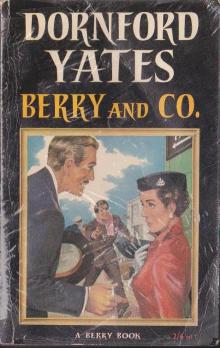 Berry and Co.
Berry and Co. Jonah and Co.
Jonah and Co.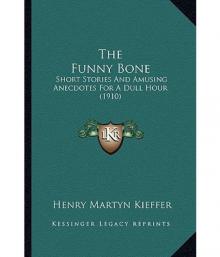 The Funny Bone: Short Stories and Amusing Anecdotes for a Dull Hour
The Funny Bone: Short Stories and Amusing Anecdotes for a Dull Hour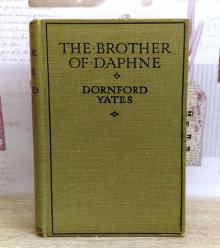 The Brother of Daphne
The Brother of Daphne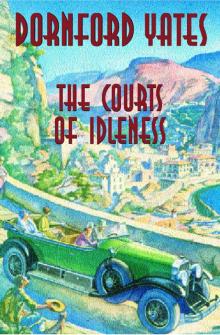 Courts of Idleness
Courts of Idleness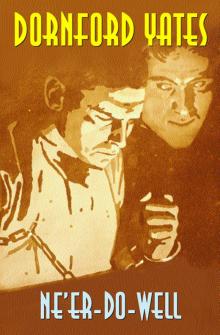 Ne'er Do Well
Ne'er Do Well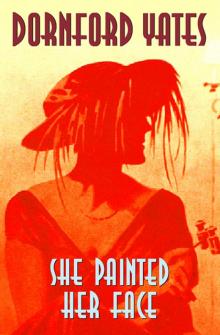 She Painted Her Face
She Painted Her Face Safe Custody and Laughing Bacchante
Safe Custody and Laughing Bacchante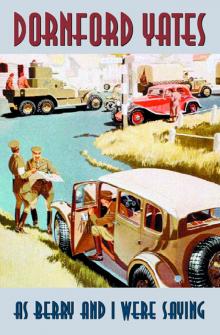 As Berry and I Were Saying
As Berry and I Were Saying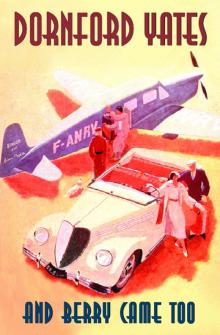 And Berry Came Too
And Berry Came Too Valerie French (1923)
Valerie French (1923)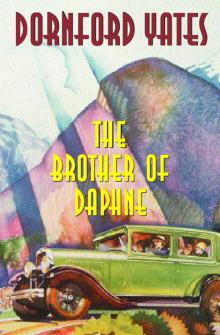 Brother of Daphne
Brother of Daphne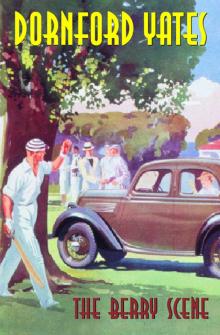 Berry Scene
Berry Scene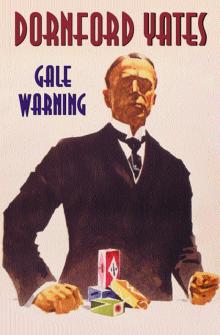 Gale Warning
Gale Warning B-Berry and I Look Back
B-Berry and I Look Back Storm Music (1934)
Storm Music (1934)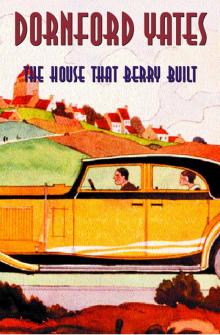 House That Berry Built
House That Berry Built